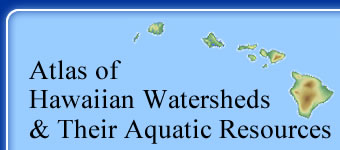
Introduction - Stream Animals: Alien species
Hawaii has the regrettable distinction of being the world’s most conspicuous example of what not to do in the introduction of non-native species. The long list of aliens includes plants and animals, both terrestrial and aquatic, and, among the latter, both marine and freshwater. Some introduced species have not proliferated, and a few appear to be harmless. However, many have become invasive and have exerted hugely negative effects on the islands’ flora and fauna. Freshwater streams and estuaries have been especially severely affected. Entire lakes, streams, and estuaries have become choked with non-native vegetation to the point that native plants are crowded out, egg-laying sites for stream fishes and invertebrates are buried beneath vegetation, mud, and silt, and the water no longer has sufficient dissolved oxygen to support aquatic animals. Alien freshwater fish species now outnumber native stream species 44 to 5, and the number of introduced species is likely to increase in spite of efforts to protect native species. Several years ago, a single non-native fish family (the Poeciliidae, including introduced mollies, swordtails, and mosquitofish) was identified as the source of internal parasites (roundworms and tapeworms) well documented to be pathogenic in indigenous stream fishes on all islands (Font, 2007). In many streams where the parasites are established, removing every non-native fish would have little effect because the life cycle of the worms now can be sustained by the natural residents alone. The only workable half-remedy appears to be maintaining strong flow in streams and allowing freshets to flush them out periodically. Non-native fishes and invertebrates are much less capable of keeping position in a strongly flowing stream and are less able to withstand the scouring effect of a flash flood. Although all aliens may not be eliminated by stronger flow and more effective flash floods, perhaps a reduction in their numbers will have a beneficial effect.